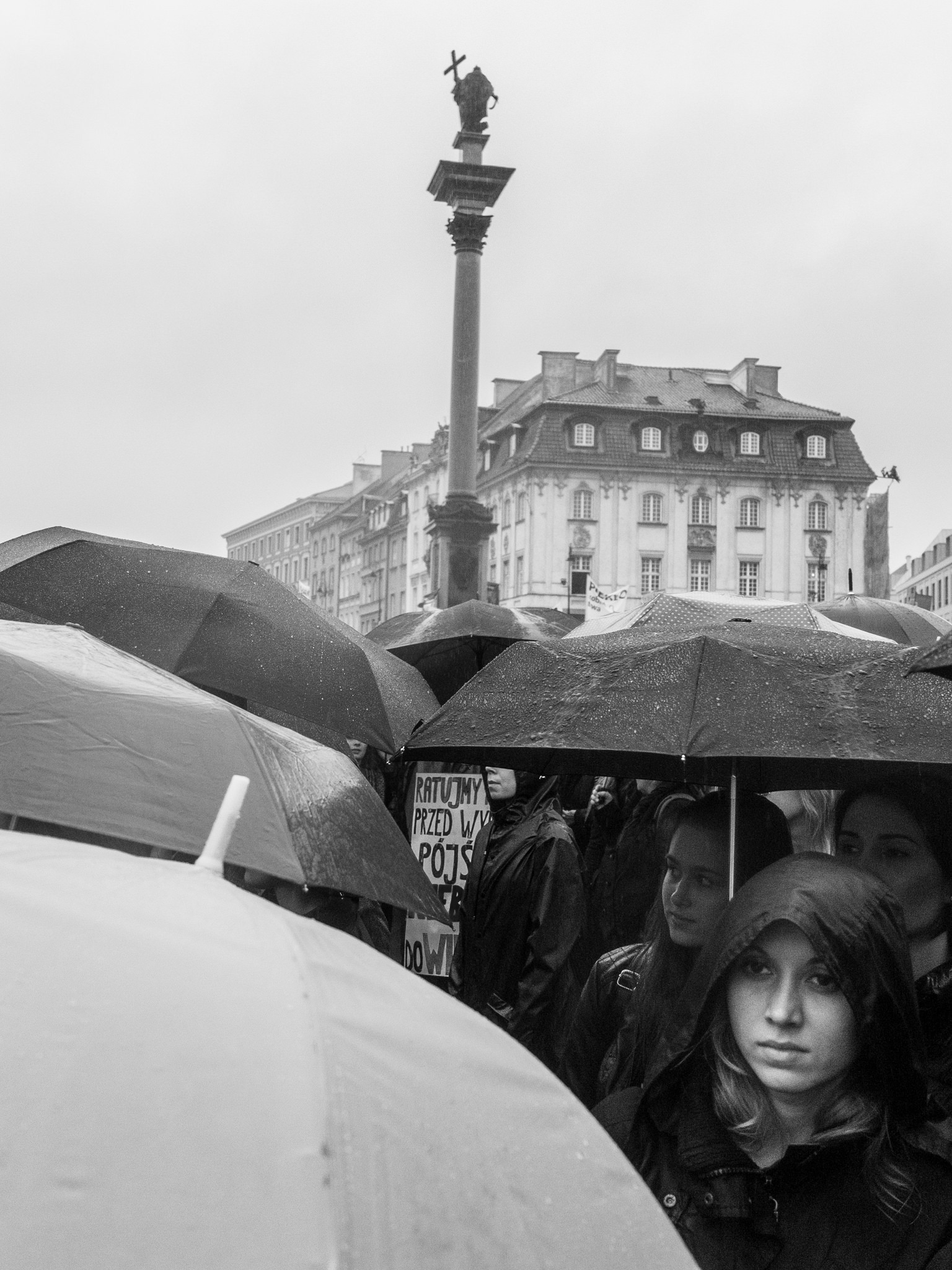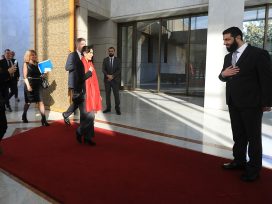The question which faces Europe most pressingly is not only whether there has been progress since 1989 on creating gender equal citizenship as a prerequisite for socially just societies, but more generally, how healthy democracy itself is today. The EU is weak and contested, especially after the disastrous Brexit vote, yet it is still national governments which wield the power of inclusion and exclusion, as vividly demonstrated by the intransigent stance of individual EU states like Britain or Hungary towards the desperate plight of refugees fleeing war, conflict and poverty.
The euphoria surrounding the fall of the Wall fostered great hopes of a new epoch of peaceful change towards material wellbeing as well as political freedom for the former state socialist countries, bringing about a convergence of East and West. In fact, the dominance of neoliberal ideology prioritised individual over social responsibility and set about shrinking the state in favour of a market-led economy which would, according to that ideology, suffice as social regulator.
Today this ideology can be seen to have failed. Everywhere there is hugely increased social inequality, and gender equality has (as the EU Institute for Gender Equality reported in 2015) slowed almost to a halt since 2005. This both reflects a lack of political will and demonstrates the disproportionate burden borne by women, especially since the 2008 recession.

Black protest in Warsaw, October 2016, against the reform of abortion laws. Image: Grzegorz Żukowski, Flickr.
However, if neoliberalism is dead, someone has forgotten to inform national governments. Faced with the increasing power of global corporations and a perceived loss of sovereignty to the EU, individual countries are retreating into inward-looking, indeed xenophobic nationalisms. Governments continue to support the creed of individualism and have surrendered to the unbridled might of banks and financial markets. They now use the newly rediscovered virtue of state intervention, not to mitigate the effects of the economics of greed, by creating more jobs or supporting greater investment in health, education, social care and welfare support. Rather they deploy divisive populist rhetoric, identifying scapegoats on which to focus the anger of disaffected, neglected voters.
In the current scenario, the concept of citizenship has been degraded to the right to vote. The fiasco of reducing complex questions to a simple ‘yes’ or ‘no’ vote renders referenda a very questionable democratic instrument, as the British case clearly illustrates. Citizenship as a package of rights and responsibilities within a context of social cohesion has disappeared in favour of a dog-eats-dog approach, in which economic success or failure is posited as a purely individual responsibility. Indeed the whole notion of social responsibility for a healthy political culture, for economic justice and social cohesion seems to have disappeared.
This has clear consequences for gender equality. Gender equal and socially just societies require a framework of claimable entitlements. This requires public investment in infrastructure and social services. Such state intervention has long been recognised by economists as necessary for balanced, healthy economies and social welfare. Although the rejection of state intervention was understandable in the immediate aftermath of the oppressive state socialist experience, it is important for feminists to reconsider the role of the state as enabler of the preconditions for making gender equal citizenship work.
Are there fewer borders and barriers since the Berlin Wall fell in 1989? Above all, has the Wall in our heads fallen, leaving more openness and tolerance in place of prejudice and discrimination? Sadly, the opposite is true. European politics in 2017 is characterised by toxic and exclusionary discourses, fostering hatred of ‘Others’. These have created a climate in which people feel entitled to express openly their racism, homophobia and misogynistic behaviour. Sexual abuse and violence against women are far from being confined to distant countries dominated by ignorance, poverty or conflict; no, they are endemic within our supposedly civilised European countries.
Scholars of gender have long argued that gender, or a gender perspective can be seen either as a lens or tool with which to understand better and measure more accurately the health of the social fabric. This is apt because gender characterises most social relations, as well as being constituent of all professions, all political and social structures. As a gender-sensitive approach is inherently cross-disciplinary, it is also an appropriate tool of analysis in all academic disciplines. I would argue that today gender is more than a perspective, a way of seeing, or a tool of measurement. In a bitter twist to the practice by which those on the right borrow, co-opt, or steal the ideas or the political discourse of the left in order to appeal to the left’s traditional voters, feminist discourse is now being instrumentalised by ultra-conservative, populist and extreme right-wing politicians in support of nationalistic and authoritarian policies.
There are many and proliferating examples of gender being used as alibi or figleaf for exclusionary nationalism, and in the process becoming a barometer of the shift to politically fomented intolerance, as well as of social unease in integrating ‘Others’ into our increasingly multicultural societies. This applies to attempted prohibitions on women’s clothing, but also to expressions of concern for women’s rights used not as justification for human rights standards, but quite the opposite, as rationalisation for discriminatory practices. Even the first Muslim Mayor of London Saddiq Khan bowed to this pressure during his election campaign in 2016 by opposing veiling, suggesting that openness was necessary in a democratic society. Unfortunately no such demand for transparency applies to the business dealings of multinational companies which avoid paying national taxes, using fictitious companies and tax havens to mask or veil their inordinately huge profits.
Anti-terrorist concerns were dismissed as false arguments by the French court which overturned the scandalous burkini ban in summer 2016. The multiple ironies in pictures of policemen standing over a woman on a French beach demanding that she undress in the name of public decency and security can scarcely be over-stated. Obviously the whole burkini fiasco had nothing to do with either concerns for gender equality or respect for women’s right to choose what they wear. Rather it revealed a country where understandable nervousness in the wake of terrorist attacks has fuelled resentment of the country’s large and discriminated Muslim population.
When large numbers of women were sexually harassed or assaulted at a Cologne New Year celebration (2015/16), apparently by men of North African or Arabic appearance, rather than sexual abuse becoming the focus of discussion, the event was used to stoke outrage and opposition to Chancellor Angela Merkel’s 2015 open-door policy towards Syrian refugees. Subsequent regional electoral successes for the AfD, the Alternative for Germany, bear out the success of this populist rhetoric. The Polish ‘War on Gender’, or on ‘Genderism’ is a rather different example, in which gender is used as weapon in an increasing rejection of liberal values of tolerance, democracy and individual choice. The Polish government’s back down from a total ban on abortion as a result of huge demonstrations by women all over the country is testament to the power of popular movements, even in the context of increasingly authoritarian governments. As many of the women involved recognised, however, this was merely the prelude to much-needed campaigning to liberalise the tightly restrictive existing abortion law. Indeed the ‘war’ on ‘gender madness’ declared in Poland and elsewhere encompasses multiple issues including intolerance of gays and opposition to sex education, derided by some Polish churchmen as worse than the Holocaust. The persecution of gay men in Chechnya in 2017 is another example of the way that gender is used as a weapon with which to attack liberal values in the name of the ‘pure’ nation.
In a variety of contexts, then, contested or conflicted political terrain is muddied and obscured (‘veiled’ and thereby mystified) by being ‘re-presented’ as a question of gender or of religion. While gender oppressions such as unequal pay, unequal political and professional representation, lack of childcare provision or violence against women continue unabated, feminism and gender equality are constructed as ‘the enemy’, standing in for, or distracting attention from dangerous and distorted socio-political tendencies.
It is time for a feminist rethink. 2016 is not 1989, nor even 2009. The rejection of the entire state socialist experience as a form of Soviet colonialism was paralleled by the post-colonialist turn in western European scholarship. Resulting emphasis on the differences between women, and between histories East and West eclipsed the need to recognise the shared experiences of democrats across Europe subjected to the individualistic bent of neoliberalism with its rejection of citizenship rights and social justice aspirations. While it was important at the time to stress the specificities of different experiences, it is all the more important now, while acknowledging and celebrating those differences and specificities, to work together in feminist and progressive alliances for a more inclusive politics. Feminists and progressive activists in eastern and western Europe need to hear each other’s voices, acknowledge the located politics of their various situations, and yet act together against narrow nationalisms, closed borders and xenophobia, and for gender equal, socially just and inclusive societies. Only thus can we avoid conflicts and rescue the European project of cooperation between peaceful and tolerant democracies. Only thus can a politics of hope and humanity prevail over hatred and the death of compassion.







